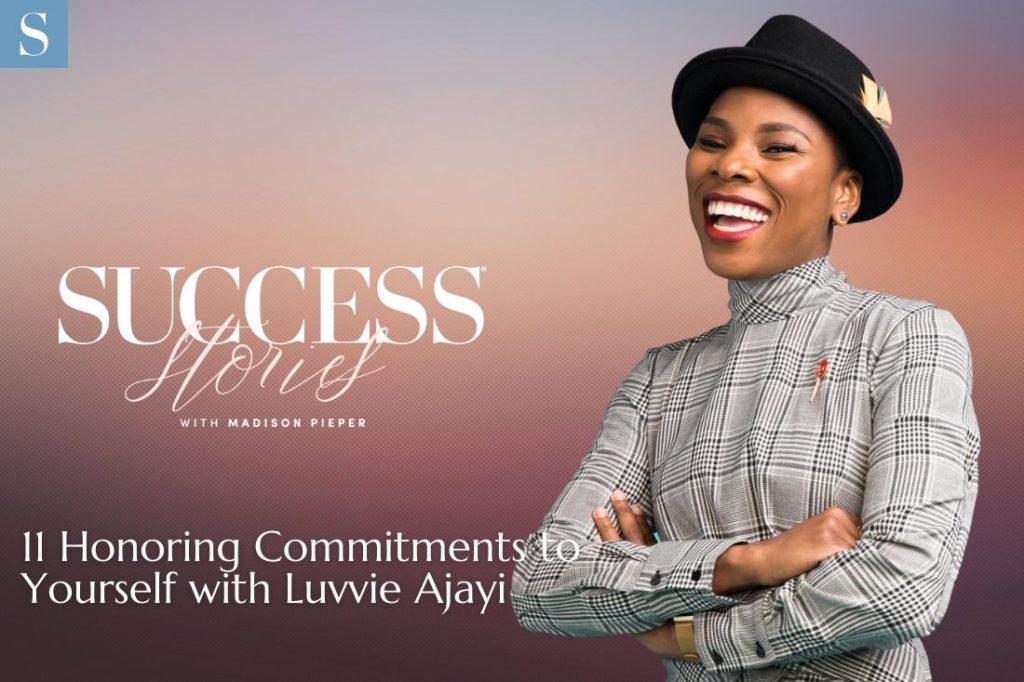Sorry is supposed to be the hardest word, yet many of us live in a constant state of apologizing for who we are. Especially marginalized people. We’re sorry for being too opinionated, too talented, and for not meeting other people’s expectations.
Luvvie Ajayi Jones is done with apologizing, and she wants more people to join her.
You may know Luvvie from her best-selling book I’m Judging You: The Do-Better Manual, published in 2016, or from her TED Talk, Get comfortable with being uncomfortable. She’s also an in-demand speaker and has released a second book, Professional Troublemaker: The Fear-Fighter Manual. Or maybe you read the blog that started her career as a rebel with a cause.
Finding success hasn’t made Luvvie sit back. She’s now not only fighting to make her own voice heard, she wants to empower others to unapologetically follow their dreams.
“We spend a lot of time trying to make sure we don’t disappoint other people, and we end up disappointing ourselves,” she says. “I deeply believe that we weren’t born for the sake of not disappointing other people: Our purpose is bigger than other people’s expectations of us, other people’s ideas about us.”
In this episode of SUCCESS Stories, Luvvie tells SUCCESS’s Madison Pieper how she finally claimed the title “writer,” why she puts her own goals ahead of other people’s demands, and why privilege isn’t an accusation—but can be a tool for good.
Make yourself proud.
A lot of us were raised to treat other people’s expectations as our guide to life. We constantly worked to please our parents, coaches, teachers, bosses, friends and partners.
However, this approach forces us to live in a box of ambitions built by other people. When we look around and realize that we have dreams that don’t fit in that box, we have to choose between staying safe but stifled, or reaching for new limits and potentially facing backlash.
It’s hard to go against people you respect. But ending your life regretting the things you didn’t do is harder.
“We have to be perfectly fine with letting people down, as long as we’re making ourselves proud,” Luvvie says. “Because at the end of our lives, we’re the ones who have to contend with how we lived, not the people who we tried to not disappoint.”
As someone who has boldly forged her own path in life, Luvvie says that telling people you’re doing something they didn’t expect gets easier. You might be surprised by how accepting they are, especially if you’ve proved yourself generally capable.
“Honor who you say you are, show up time and time again as consistent, as reliable, as clear,” she says. “Then, when you pick a different path, people are less willing to question you.”
Don’t minimize your gifts.
Here’s a secret: You don’t need a certificate in a frame to be good at something. People often feel uncomfortable claiming labels like “writer” or “painter.” They think you need some kind of incontrovertible proof, like a best-selling book or a gallery show, before you get to use that word to describe yourself.
The reality is that no one is going to show up at your door one day and declare that you are now a writer. You become a writer by writing every day.
Take it from Luvvie. Although she wrote a successful blog for years, she diminished that accomplishment by calling herself a blogger. “I was minimizing my gift: I was like, ‘Oh writing, it’s just a hobby,’” she says.
But in 2012, Luvvie found herself backstage at the Oscars, surrounded by other journalists, having been invited to cover the awards for her blog. She realized that she was no less of a writer than they were.
“You don’t have to downplay yourself to be a good person,” Luvvie says. “You don’t have to deny your gifts to be humble. … You have the right to use your voice, to use yourself, to use your life as a testimony of what’s possible.”
Use whatever privilege you have for the good of others.
Privilege is a fact, not an accusation. It’s simply stating that certain things about you that you didn’t choose mean that you don’t face challenges other people do.
That can include being born to a rich family; being white in the Western world; being male in patriarchal societies; or being heterosexual in societies where any other kind of sexuality is treated as taboo or unnatural.
“[Privilege] is not a judgment, and I want people to remove that idea,” Luvvie says. “Realize that when somebody points out your privilege, they’re pointing out a fact about you. … It’s not a fight. It is more of a fact.”
Once you recognize the privilege you have, use it to empower others.
Luvvie says that although she’s often still the only Black woman in the room, she recognizes that being invited to the table is a privilege. And she’s made enough money that she can afford to speak out and risk losing income.
“For those of us who… are not at risk of losing our livelihoods, our homes, we have no excuse to not be courageous in these moments that are tough,” Luvvie says. “I want to be able to use my power so the person who’s living paycheck to paycheck does not have to put herself on the line, ever. I want my power to hopefully make sure she stops living the paycheck to paycheck life.”
SUCCESS Stories with Madison Pieper is no longer releasing new episodes on the SUCCESS Podcast Network, but you can still listen to the full conversation below.




